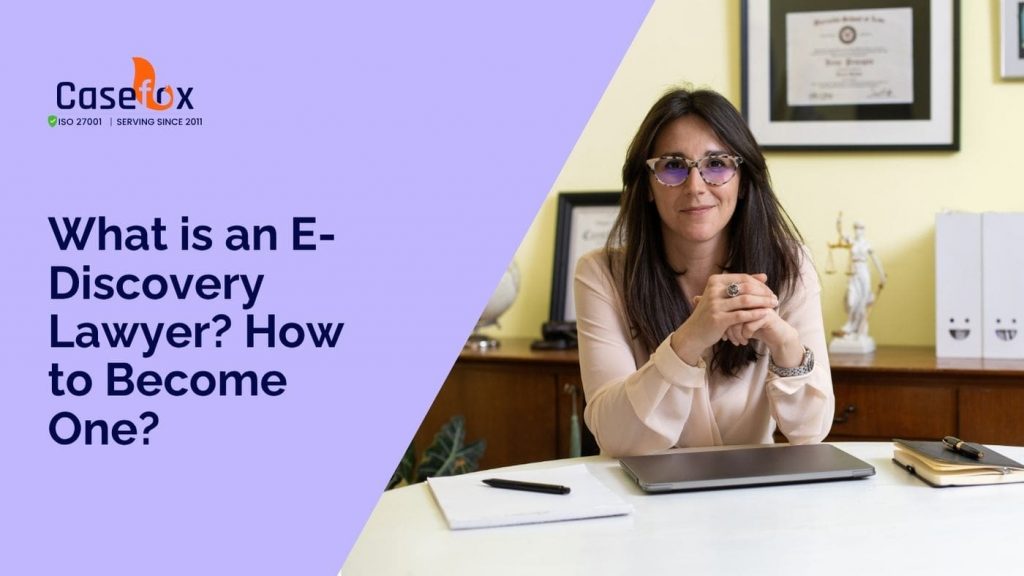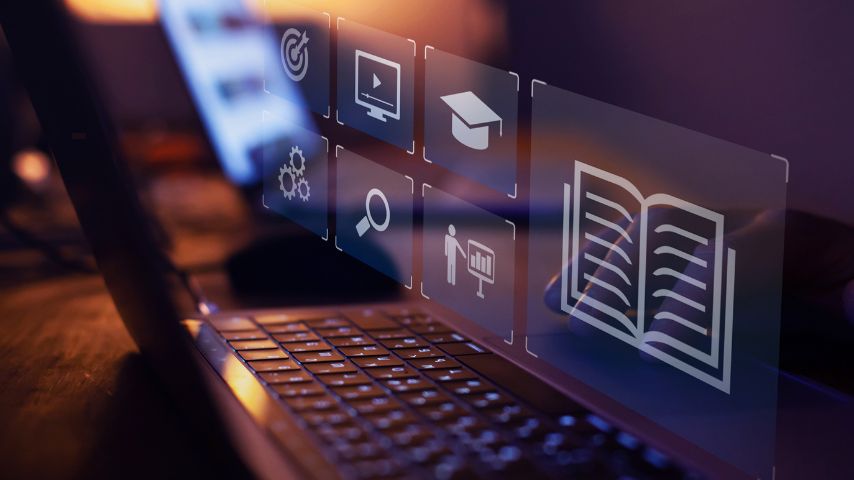What is an E-Discovery Lawyer? How to Become One?

Think about the last time you searched for an important file on your computer. Now imagine that times 10,000, with opposing lawyers demanding every message, draft, and deleted spreadsheet. Welcome to modern litigation, where cases are won in the digital trenches.
Meet the Fixers:
This is where e-discovery attorneys (or electronic discovery lawyers if we’re being formal) make their living. They are the rare humans who really like:
- Trying to understand the digital anarchy, yes, even the 47 iterations of the same contract.
- Satisfying judges with the immaculate organization of evidence
- Preventing sincere customers from destroying important information
If you want to know more about an e-discovery lawyer or want to become one. This blog can be a perfect start for you.
What is an E-Discovery Lawyer and the Importance of an E-Discovery Lawyer:
A legal-tech hybrid, an e-discovery lawyer is an expert in handling digital evidence for cases and investigations. They include equal elements:
Finding important evidence in emails, Slack, cloud storage, and even IoT devices is the work of a Digital Investigative Lawyer.
Legal Protection: Making sure collected, stored, and generated data is free of errors that could cause penalties.
Bridging the gap between legal teams and IT departments: A Tech Translator
The reasons behind their crucial nature nowadays:
- Ninety percent of legal evidence is digital: emails, messages, documents.
- Judges require faultless handling of digital records.
- One miscalculation, like a deleted team’s message, might cost millions.
Actual-World Case:
✓ Finds the home of all pertinent data, including in employee devices.
✓ Establishes legal holds to stop evidence damage.
✓ Employing particular instruments, filters 50,000 papers down to the 200 relevant ones.
Let’s be honest, no one became a lawyer to play hide-and-seek with email threads. But here is the awkward fact: that make-or-break bit of proof? It’s probably in someone’s archived Teams chat or an outdated backup disk. Judges, meanwhile, expect flawless e-discovery; clients worry about compliance; one bad click can turn a powerful case into a costly catastrophe.
Traditional document review is just not good enough anymore, given that employees utilize five different messaging apps, cloud storage spread over three continents, and new artificial intelligence technologies generating more data than ever. Companies lacking e-discovery experts are like cops trying to solve crimes without checking cell phone records.
What does an E-Discovery Lawyer do?
Basically, the legal world’s digital detective is an e-discovery attorney. They control the entire lifecycle of digital data in court rather than just examining evidence. This is the split:

1. They run the E-Discovery Process so Litigators don’t have to
While trial lawyers concentrate on arguments and tactics, e-discovery lawyers manage the messy behind-the-scenes effort:
- Data preservation tells customers not to erase those “harmless” messages
- Gathering of evidence from emails to cloud backups, yes, even smart refrigerators have been subpoenaed
- Filtering the noise, employing technology to identify what is important, so no one spends 300 hours reading communications
2. They Talk Both “Lawyer” and “Tech”
Between legal teams and IT departments, these professionals convert. For instance:
- To the IT team: “Yes, that includes the edit history; we require all metadata for these PDF files.”
- To the court: “Your Honor, by producing these documents in their original format, we have satisfied FRCP Rule 34.”
3. They keep everybody from getting into problems
One incorrect move in e-discovery might result in sanctions or even worse. E-discovery attorneys:
- Negotiate compliance minefields: GDPR, HIPAA, and other alphabet-soup laws.
- Avoid well-intentioned errors like a client “tidying up” their inbox mid-case.
- Certify everything by the book to prevent someone from getting fined for being spoiled.
The E-Discovery Process in Law
Let’s lift the curtain on e-discovery, the process by which digital clutter becomes courtroom-ready proof. This is how it shows itself in the real world:

1. Recognition: The Digital Treasure Hunt
“Where is that 2019 email?”
E-discovery attorneys identify the location of critical data:
- Visible locations: business servers, email accounts
- Not so obvious sites: Slack threads, cloud backups, even BYOD phones
Reality Check: Employees use considerably more apps than IT knows about.
2. Preservation: Hanging ‘Do Not Disturb’ Signs
“No, you can’t ‘clean up’ your files right now!”
Legal holds prevent data loss, yes, even for “accidental” deletions.
3. Collection: Gathering the products
“We need everything, yes, even the drafts.”
Forensic experts make duplicates of hard drives to save metadata.
4. Sorting Through Chaos
“47 variations of the same contract? Really?”
Deduplication is the removal of 100 copies of the all-staff memo.
Turning scanned PDFs into searchable ones
Harsh fact: This phase accounts for thirty percent of e-discovery expenses.
5. The Real Money Pit: Reexamination
“Why are we reading 10,000 cat memes?”
Lawyers flag papers as privileged/junk.
Game changer: artificial intelligence solutions forecasting what matters
Most teams still depend on keyword searches and regret it.
6. Production: Sharing
“Here is your proof with all our secrets blacked.”
Sending court-approved formats for documents
Following instructions
Not sharing confidential information like that, embarrassing draft email
How to Become an E-Discovery Lawyer
1. Get Your Credentials (The Non-Negotiables)
- Law degree + bar admission. Because you still need to “think like a lawyer” before you geek out on metadata.
- Tech-adjacent coursework, sneak these into your electives:
- E-discovery basics
- Cybersecurity law
- Data management
2. Pay Your Dues
You’ve got options, none glamorous:
- Work at a firm that does commercial litigation.
- Corporate legal departments – Learn how clients actually store (and lose) data.
- Tech companies hire Juris Doctors to bridge the lawyer-engineer gap.
Tip: Start as an “e-discovery assistant” if you have to.

3. Certifications
Skip the MBA—these credentials matter:
- CEDS – The gold standard (but study hard, it’s not easy).
- ACEDS – More affordable, still respected.
Relativity Certified – If you know this software, recruiters will slide into your DMs.
Tip: Cloud certifications (AWS/Azure).
4. Master the Tools
You don’t need to code, but you’d better understand:
- Relativity/Everlaw – The Photoshop of e-discovery.
- Data analytics – Spotting patterns in 10,000 docs.
- Basic cybersecurity – So you don’t accidentally expose a client’s entire Slack history.
The Shortcut If You’re Impatient
- Take ACEDS online ($1,295 – prices can vary).
- Learn Relativity via free webinars.
- Apply to e-discovery project manager jobs at vendors.
Where E-Discovery Attorneys Actually Work (and Why It Matters)
E-discovery is a highly sought-after legal skill, not only a specialty. This is where these digital detectives excel and why companies are eager to employ them:
1. Law Companies (The Litigation Backbone)
Embedded inside boutique litigation or big legal companies.
You would handle this as follows:
- From drowning in data dumps, rescue trial attorneys.
- Design search tactics to find “that one email” amid two million documents.
- In court, debate why your client deliberately did not remove evidence.

2. Corporate Legal Departments
Companies’ (tech, finance, healthcare) in-house workers.
Your Actions Would:
- Establish data retention rules (so no one texts about mergers on WhatsApp).
- Prepare for lawsuits before they happen, because getting sued is unavoidable.
- Train executives to stop saying foolish things in writing (a full-time job).
3. Government
Your Actions:
- Reveal white-collar crime hidden in encrypted files.
- Chase down erased evidence (spoiler: it’s never truly gone).
- Testify about your forensic results.
4. Advising and Suppliers
What would you do?
- Assist legal companies in resolving their technology issues.
- Teach Relativity to attorneys and hope they recall how to search.
- Offer last-minute solutions to customers.
Conclusion
The future is digital; therefore, e-discovery lawyers are running the show.
Let’s be honest: Data is the whole battlefield, not just proof. E-discovery is the foundation of current law as lawsuits are now waged over threads, removed messages, and AI-generated content.
Ninety percent of legal evidence today is digital, and handling it improperly can destroy careers or cases. This explains why e-discovery attorneys have evolved from backroom tech support into essential legal strategists.
Why Jump In Now?
Companies, businesses, and governments are looking for lawyers who truly know digital evidence, therefore, demand is exploding.
Tech plus law equals career insurance. Your abilities become more important as more cases depend on information.
Big Earning Potential: Experts charge premiums because no one wants a $10 million sanctions disaster.
Your Following Move
- Obtaining certificates such as CEDS or Relativity quickly opens doors.
- Before your competitors do, acquire proficiency in Relativity and Everlaw, two of the tools.
- E-discovery experts are needed in business, corporate, government, or consulting. Find your path.
- Lead the digital legal revolution rather than only observe it.
We hope this information is helpful to give you the right start for your journey.